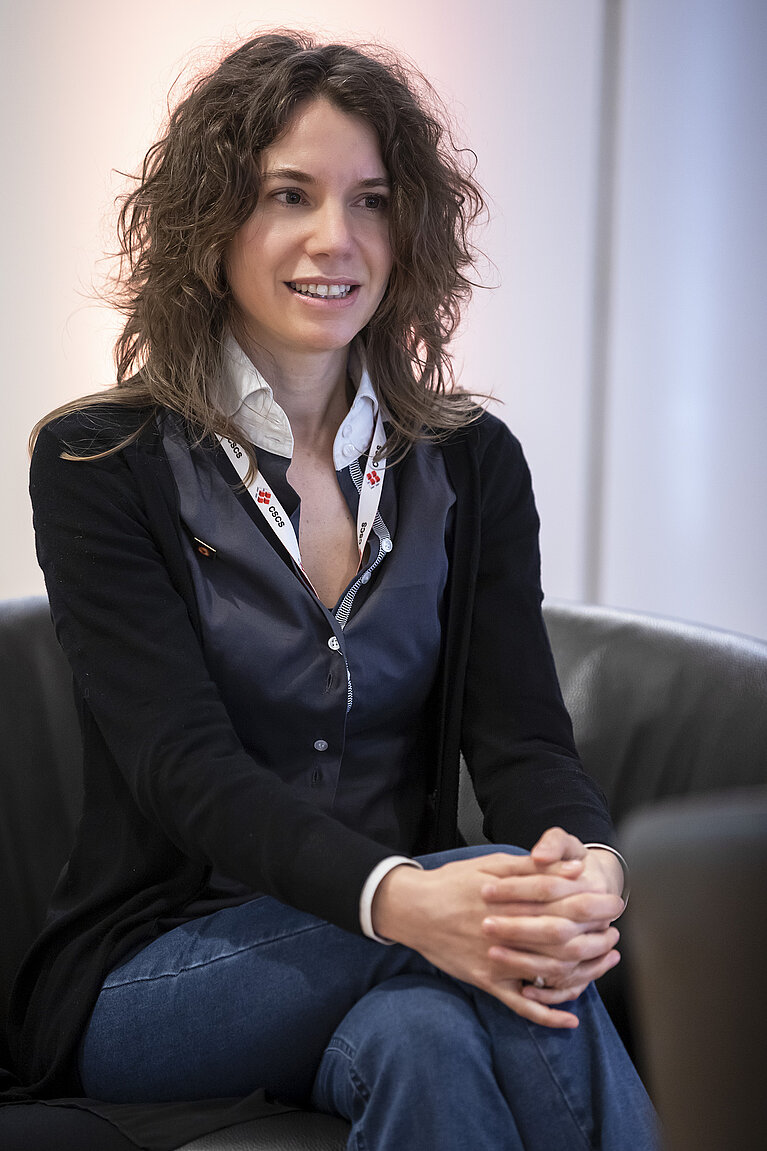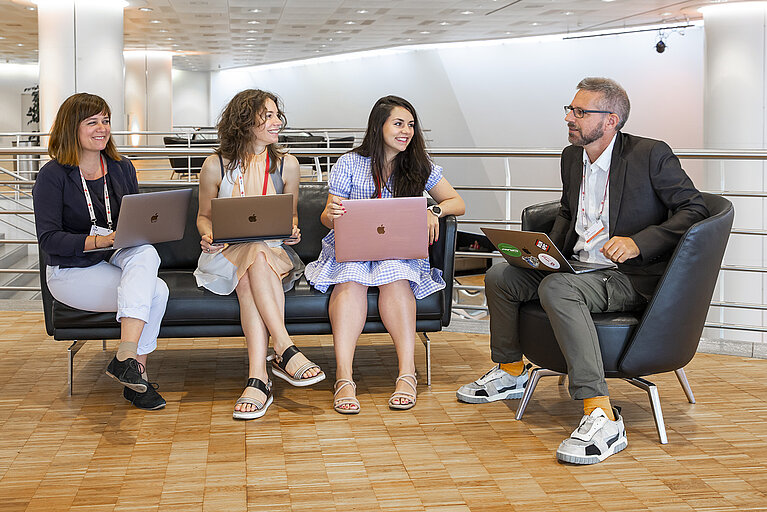October 13, 2022 - by Simone Ulmer
Tatjana, what is your favorite thing about organising a conference like PASC?
TR: It is really the program management! It’s like a puzzle with many pieces. When I took on this project, I had to first understand the vision for the conference. Once I understood what the puzzle should look like in the end, it’s about getting all the pieces together that will make it possible to complete the picture. Each edition is approximately one year of work.
What does that look like in concrete terms?
TR: First we start with the selection of the location and of the two conference co-chairs — one chair is typically from Switzerland and one from abroad, and they come from different scientific fields and thus bring along their own networks — and they are selected together with the steering committee. The co-chairs then set the topic of the conference for which they are responsible and select the plenary speakers. Next, we assist the co-chairs in building the scientific committee while discussing every component of the puzzle in biweekly calls. We know the number of contributions we need in order to build the program. The scientific committee is a key player, as its members can tap into their own specific scientific communities and encourage the submissions of papers, posters, and minisymposia. They will also manage reviews of the contributions that come in as assigned.
The goal as a whole is to ensure good balance within fields and topics so that the entire audience of the conference feels that they belong here and are represented here. An interdisciplinary exchange can only be possible if people feel they belong to the PASC Conference community.
What drives you in this work?
TR: I am passionate for a few reasons. The PASC Conference is a project as it develops year after year — its offerings have grown to include papers, as well as a panel discussion and an interdisciplinary dialogue, and its audience has grown to include HPC experts coming from approximately 25 countries. It is like a baby that you see growing year by year, and this gives me great satisfaction. I also enjoy collaborating with the various people that allow it to grow — with the co-chairs, the scientific committee, as well as with the organizing team who monitor what worked and what did not work for each edition and how the development is unfolding.
In the organizing team, we have Tim, who brings a scientific background and with whom I like to reflect on more strategic aspects; Michèle, who is very detailed and methodical and who coordinates the tasks related to evaluating the contributions that are submitted; and Raluca, who enjoys looking for venues for the conference’s social evening offering and who has been coordinating the participants’ registration process. We discuss most elements of the puzzle all together. But also the venue responsible, the catering, the cleaning team, and so on determine the success. All these people bring their own specific skills to the project, which also makes each edition a bit different. It’s fun to work with people who really care, as they know they bring a personal contribution and touch to the project.
So, your main task in organising the PASC Conference is to have the overlook of all the different activities and get all the pieces of the puzzle in the right place at the right time.
TR: Yes, this is definitely my responsibility, but it doesn’t mean that I do not also do my part in the “doing” itself. I am the one helping co-chairs recruit the scientific committee and manage the invitations of the plenary session presenters, and I also maintain the relationship with the venue, for example.
What do you fear most during the conference?
TR: At some point, the show we have been preparing for so long needs to start and go on. You cannot get stuck on the “feels”. A lot of things can go wrong, so my policy is to be as well prepared as possible. When the event comes, I know I already did my best in thinking about all scenarios that could happen and discussed them with the team so as to elaborate a response plan in case any of those things should happen. Getting to the event without going through this process would scare me. I feel that I am at a good point when I exhausted the number of scenarios we can think of.
How many hours of sleep do you get during the conference?
TR: Truly not many… The night before the conference starts, you never sleep. I am available around the clock, seven days a week, already in the weeks before the conference. Michèle, Raluca, and Tim have also worked several extra hours.
I must say, though, that the PASC22 edition was a very special one. It was complicated because of COVID and because the conference was held in a hybrid format. Until the end, we did not know what the situation would be and how many participants could really come in person. But it's not just about that, it's also about making your community feel comfortable. This year we created a duty-of-care plan and paid special attention to the logistics. Several hours were dedicated to discussing the ventilation system in all spaces we rented, cleaning protocols in those spaces and of all touch points, and that food would already be portioned but still sustainably ready in glass jars. I’m not saying that we did it all perfect, but we did try. In one sense, I think that COVID also helped to reevaluate the importance of all these sectors that are involved in the production of an event that usually nobody mentions.
What do you need most during those days?
TR: My cell phone, my excel tables, and my team. During the conference itself, I am taking care of the plenaries. The tables show me what exactly happens at each moment, and indicates the telephone numbers of all presenters. Other members of the team know exactly what to do for the area they oversee during the conference. Thanks to preparation, we are all very independent. Michèle and Tim are looking after the logistics of all the parallel sessions — from the technique to the water bottles for the speakers. Raluca knows what needs to happen at the reception when we have a request for a new registration, or a participant wants to connect remotely to the conference and cannot find the credentials, and so on. Volunteers in the rooms where sessions unfold and those at the reception have been instructed about their tasks, but something “unexpected” could always happen, and they either react on-the-spot or refer to us. It is really a team effort!
What was your worst event nightmare in the past?
TR: For a past edition of the PASC Conference, lots of the printed materials — like labels for the poster panels and badges — had been printed out incorrectly and we did not have much time to adjust them. Again, the whole team helped in identifying what needed to be reprinted and cut, and together we could do what was needed to resolve the situation. But fortunately, in my time at CSCS nothing truly serious has happened.
What was the most impressive experience for you in all those years?
TR: The truth is that the most rewarding moment is when you meet the participants and feel the energy of the crowd, then you feel that all those months of hard work have paid off.
For you, scientists are ...?
TR: First of all, they are people. I don’t want to get stuck on the idea that because we “speak different languages” — which we do — we cannot find a common language. We need both languages: we prepare the platform for all these scientists to meet, and they exchange knowledge to build upon their current expertise. This is what PASC is about. We need to work together in order to make that happen. If I don’t understand what they need, where they want to go, then I won’t be able to provide them with the platform that allows them to get there.
And students? — You have a whole team of them for your support. How is this for you?
TR: Each year, we have wonderful people on the volunteer team who are really smart and ready to act whenever needed. Working intensely together for three days usually means building good relationships with peers and the organizing team. We really enjoy getting to know them and spending time together. We need their help in order to manage the conference, and we give them the possibility to hear talks free-of-charge and attend the lectures in which they are interested. The staffing plan is basically designed around their interests. They write down which lectures they absolutely wish to attend and I either schedule them for support during those talks, or I give them free time during those hours.
What would you change if you could?
TR: The project has grown a lot, and we are a small team. We would still need to add some skills and manpower to the group, especially now that we are working with a hybrid format. We lack somebody with IT skills, for example.
When will you start with the organization of PASC23?
TR: I said it is one-year work, but it is actually a bit more in the sense that we have already booked the next venue, have the next co-chairs on board, and have a specific theme for the next edition of the conference a few months before the current year’s event is being produced. There is a continuation, and this is what motivates me. Each year there are new additions, new people working on it, and our team is the continuation element in this process.
What is the first thing you do when the conference is over?
TR: I take some time off!
Further information:
PASC23 will take place from June 26 - 28 in Davos, Switzerland.

